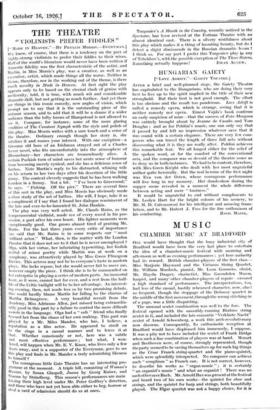HUNGARIAN GAIETY
[" LOVE ADRIFT:'—GAIETY THEATRE.]
AFTER a brief and well-planned siege, the Gaiety Theatre has capitulated to the Hungarians, who are doing their very best to live up to the spirit implied in the title of their new stronghold. But their best is not good enough. The effort is too obvious and the result too ponderous. Love Adrift is called a comedy opera, which is strange, seeing that it is neither comedy nor opera. Ernest Vajda's book confirms an early suspicion of mine—that the success of Fata Morgana was entirely brought about by Jeanne de Casalis and Tom Douglas ; and as for Poldini's music, one can only say that it passed by and left no impression whatever save that it was sound with a certain elegance. There are very few com- posers who can travel the length of three full acts without discovering what it is they are really after. Poldini achieves this remarkable feat. We all longed either for the relief of the spoken word, or for the comfort of the conventional aria, and the composer was so devoid of the theatre sense as to deny us in both instances. We had to be content, therefore, with Miss Gwen Knight who dealt with her most ungrateful author quite heroically. But the real heroine of the first night was Eva von der Osten, whose courageous performance will live long in my memory. Her dumb-show during the supper scene revealed in a moment the whole difference between acting and mere " business."
It would be ungrateful to end without compliments to Mr. Leolyn Hart for the bright colours of his scenery, to Mr. M. D. Calvocoressi for his intelligent and amusing trans- lation, and to Mr. Hubert J. Foss for the fine enthusiasm of






















































 Previous page
Previous page